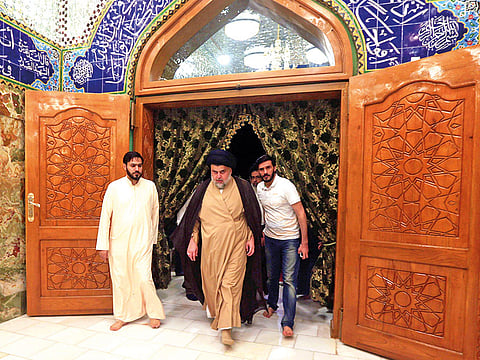Disillusionment may have helped fiery cleric
Al Sadr has criticised Iraq’s current political leadership as deeply corrupt

Baghdad: Widespread disillusionment with Iraq’s current political class appears to have helped influential Shiite cleric Muqtada Al Sadr become the early front-runner in national elections marked by record low turnout.
The election came as the country deals with the disenfranchisement of the country’s Sunni minority. Of more than two million Iraqis displaced by the war, the majority are Sunnis. Also at issue is the influence of Iran on the country: Iranian-backed Shiite militias who played a key role in defeating Daesh and were allied with the Shiite-led Baghdad government made significant electoral gains.
Al Sadr is a strong Iraqi nationalist - he is critical of any outside influence in the country - and campaigned on a platform that criticised Iraq’s current political leadership as deeply corrupt. He rose to prominence in Iraq after the 2003 US-led overthrow of Saddam Hussain when he commanded a militia that fought American troops. He also commanded paramilitary forces in the war against Daesh.
Dozens of alliances ran for office in these elections and months of negotiations are expected before any one alliance can pull together the 165 required seats.
The election lacked a clear front-runner, but current Iraqi Prime Minister Haider Al Abadi was widely seen by analysts as the likely favorite. However, despite overseeing Iraq’s military defeat of Daesh, Al Abadi is so far preforming poorly, coming in third and fourth place in most provinces, according to the partial results announced Sunday.
The electoral commission released results from 10 of the country’s 19 provinces, including the provinces of Baghdad and Basra. The commission gave no indication on when further results would be announced.
The alliance currently in second place is made up of candidates linked to Iraq’s powerful Shiite paramilitary groups, with close ties to Iran. The development is seen as an indication of Tehran’s growing influence in Baghdad’s halls of power.
The “Fatah” alliance - Arabic for conquest - is headed by Hadi Al Ameri, a former minister of transportation who lived in exile in Iran under Saddam. After the fall of Mosul in 2014 Al Ameri became a senior commander of paramilitary fighters in the fight against Daesh.
Unlike Al Sadr, who is staunchly against foreign intervention in Iraq of any kind, Al Ameri maintains close ties to Iran, praising the country’s early support for Iraq in the IS war. He has also said that he is open to American training of Iraq’s military and regularly meets with US ambassadors to Baghdad.
Al Sadr has repeatedly called for the full withdrawal of American troops from Iraqi soil.
Celebrations erupted in Baghdad’s Sadr City, an impoverished quarter that is home to some 3 million people and is named after the cleric’s late father, Ayatollah Mohammad Sadq Al Sadr. The younger Al Sadr campaigned on a cross-sectarian platform of fighting corruption and investing in services and struck a surprising alliance with the Communist Party in the capital.
Al Sadr’s sophisticated political machine mobilised his loyal base of followers to cast their ballots.
Any political party or alliance must gain a majority of Iraq’s 329 seats in parliament to be able to choose a prime minister and form a government. Dozens of alliances ran for office in these elections and months of negotiations are expected before any one alliance can pull together the 165 required seats.
Until a new prime minister is chosen, Al Abadi will remain in office, retaining all his power.
Political power in Iraq is traditionally divided along sectarian lines among the offices of prime minister, president and parliament speaker. Since the first elections following the 2003 US-led toppling of Saddam Hussain, the Shiite majority has held the position of prime minister, while the Kurds have held the presidency and the Sunnis have held the post of parliament speaker.
Sign up for the Daily Briefing
Get the latest news and updates straight to your inbox



